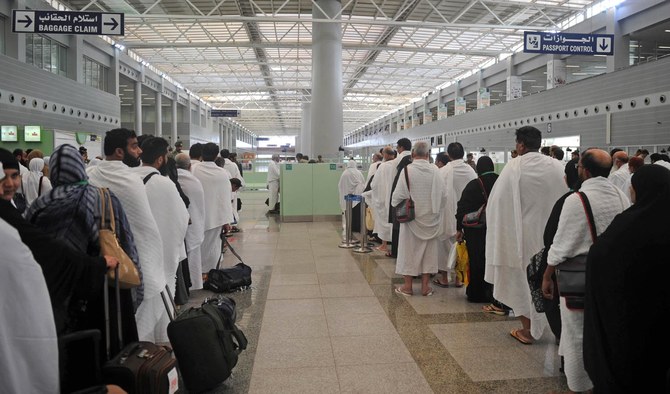ISLAMABAD: A 14-member delegation from Saudi Arabia is expected to visit Pakistan on March 31 in order to examine immigration facilities at various airports in the country, officials said on Wednesday.
The move is part of measures to facilitate more than 184,000 Hajj pilgrims as part of the Kingdom’s Road to Makkah project.
Saudi Crown Prince Mohammed bin Salman had formally granted permission to include Pakistan in the “Road to Makkah Project” – an initiative to facilitate pilgrims from across the Muslim world – during his visit to Islamabad in February.
“Pakistan’s inclusion in this project is nothing less than a blessing,” Imran Siddique, spokesman for Ministry of Religious Affairs, told Arab News on Wednesday.
He said that the Saudi delegation, comprising top government officials, would be checking arrangements for a seamless immigration process at the airports.
“They will assess the need of the staff to be deployed at our four major airports including Islamabad, Karachi, Lahore and Peshawar to get the immigration of all the pilgrims done here,” he said.
Terming it as a “great achievement” for Pakistani pilgrims, the spokesman also thanked the Saudi crown prince for extending the facility. Hajj flights from Pakistan to Saudi Arabia will begin from the first week of July.
A total of 184,210 pilgrims from Pakistan will perform Hajj this year, out of which 107,526 Pakistanis will perform Hajj on the government’s quota, while more than 76,000 will be using services offered by private tour and Hajj operators.
Siddique clarified that local immigration facilities will also be extended to those individuals who are not part of the government’s program and are planning their pilgrimage with private tour operators.
During his visit, the Saudi crown prince had signed agreements worth $20 billion in different fields including petrochemicals and renewable energy. “We believe Pakistan is going to be a very very important country in the future and we want to be sure we are part of that,” he said in his address at the inaugural session of the Supreme Coordination Council, co-chaired by Prime Minister Imran Khan and the crown prince.
Abuzar Butt, a private tour and Hajj operator, said that the completion of all immigration-related formalities at Pakistani airports will help Pakistani pilgrims, especially the elders, to save a lot of time and hassle.
“The local immigration means our pilgrims will go through the immigration process in Pakistan, saving them the hassle of going to the immigration counters once they reach Saudi Arabia,” he told Arab News.
Saudi officials’ visit to check Pakistan’s Hajj immigration facilities
Saudi officials’ visit to check Pakistan’s Hajj immigration facilities

- Kingdom to deploy staff at airports in the country to facilitate pilgrims
- More than 180,000 to perform Hajj this year
Pakistan’s president defends ongoing strikes in Afghanistan, urges Kabul to dismantle militants

- Afghanistan on Thursday launched attacks in retaliation for Pakistani airstrikes the previous Sunday
- Pakistan’s military says it is only targeting Afghan military installations to avoid civilian casualties
ISLAMABAD: Pakistan’s president on Monday defended his country’s ongoing military strikes in neighboring Afghanistan, saying Islamabad tried all forms of diplomacy before targeting militants operating from Afghan territory, and called on the Taliban government in Kabul to disarm groups responsible for attacks in Pakistan.
Pakistan earlier said it is in “open war” with Afghanistan, alarming the international community. The border area remains a stronghold for militant organizations including Al-Qaeda and the Daesh (Islamic State) group.
“(The Afghan Taliban) must choose to dismantle the terror groups that survive on conflict and its war economy,” Asif Ali Zardari said during a speech to lawmakers, adding that “no state accepts serial attacks on its soil.”
Afghanistan on Thursday launched attacks in retaliation for Pakistani airstrikes the previous Sunday. Since then, Pakistan has carried out operations along the border, with Information Minister Attaullah Tarar claiming the killing of 435 Afghan forces and the capture of 31 Afghan positions.
Kabul has denied such claims.
In Afghanistan, the deputy government spokesman Hamdullah Fitrat said Pakistan’s military fired mortar shells at a refugee camp in eastern Kunar province, killing three children and injuring three others.
Afghanistan’s defense ministry said Afghan forces carried out strikes targeting a Pakistani military facility near Paktia province, causing “substantial losses and heavy casualties.”
Pakistan’s military did not respond to questions. It has said Pakistan is only targeting Afghan military installations to avoid civilian casualties.
Pakistan has witnessed a surge of violence in recent months and blames it on the outlawed Pakistani Taliban, known as Tehreek-e-Taliban Pakistan or TTP. It operates both inside Pakistan and from Afghan territory.
Islamabad accuses Afghanistan’s Taliban government of providing safe havens for the TTP, which Kabul denies.
The latest cross-border fighting ended a ceasefire brokered by Qatar and Turkiye in October. The two sides failed to reach a permanent agreement during talks in Istanbul.
Zardari reiterated Pakistan’s call for talks, saying, “We have never walked away from dialogue.”
The Pakistani leader again accused Afghanistan of acting as a proxy for India by sheltering militant groups.
“Stop being used by another country as a battlefield for their ambitions,” he said.
Zardari cited a recent report from the United Nations Security Council’s monitoring team that described the presence of militant groups in Afghanistan as an extra-regional threat.










